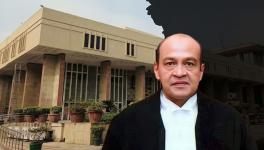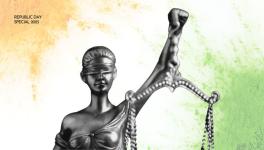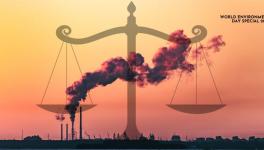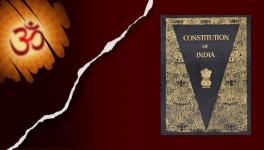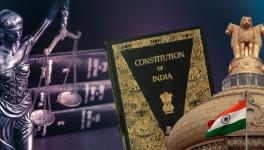The Law’s Majestic Tread
Representational Image.
Some sixty odd years ago we first came across the identification of the police force with the law, in a textbook poem at school. The poem presented a scene of youngsters kicking up a playful row on a street until the entry of a portly policeman in uniform. It gave a sort of aura (however ironic) to the police we were not quite prepared for. But later some of my friends and acquaintances who joined the police force as IPS cadre, seemed to have been persuaded of its truth.
The police are in this concept the first line of defence against forces of disorder and general harm to society. In recent decades however this image has taken quite a damaging blow. For I don’t remember having seen in many recent decades such turbulent waves of controversy assailing the police. Not only journalists, but eminent social activists and scholars, retired bureaucrats and policemen with glittering records of service, distinguished lawyers and highly respected retired judges of the Supreme Court and High Courts have expressed profound anxiety and anguish at the steep decline of the integrity and rectitude of the police.
Not that the picture had previously been one of unblemished reputation. It had at different times come under blistering criticism and censure. But the present uproar is something unprecedented and it has an edge of apprehension and panic never felt before. Hence a general perspective on the matter is called for.
The bedrock of democracy—in principle—is the rule of law. Law is what is expected to contain and control arbitrary exercise of power. Hence due administration of law is not only an essential condition of justice but it is a vital requirement of democracy as distinct from autocracy. And the police are a vital agency in the entire process of preserving the law for the safety and well-being of the citizen.
A general complaint is that the police have become quite apathetic to such considerations. That they have become henchmen of dominant political interests. That they have become shamefully adept in twisting laws and bypassing established procedures. That they have thrown to the winds principles of impartiality and objectivity without which law gets perverted into brutal tyranny. Instead of the methodical and painstaking work for which they are given credit in popular fiction—as against the flashes of insight of the private detective—they are being condemned for extremely shoddy and slapdash work aimed at harassing the innocent with an ulterior motive.
If these complaints have any substance then we are on the edge of a precipice and it will be most difficult for us as a nation to claw our way up from the abyss if there is this fateful fall. For it will cost nothing less than our democratic constitution. And a mighty initiative is needed for preventing this collapse. But the first condition of a viable solution is looking at the problem squarely in the face.
It is not the case that ordinary crimes have not been tackled at all by efficient and diligent policemen. Nor that money-mad gangsters are holding our lives at ransom like the mafia in some metropolitan areas in the United States after the First World War. But what strikes any impartial observer is the alleged rise in what may be called “political crimes”. If the police are to be believed there has been a phenomenal rise in crimes “against the nation”, putting in the shade your common and garden-variety crimes. The public is befuddled by the heated allegations and not-less-heated denials.
Parallel to this churning there is a strident and widespread chorus of voices on the social media conjuring almost out of thin air a frightening conspiracy “against the nation” by sundry Islamic forces and outfits backed by Pakistan, and that too at a time when the latter is in dire financial straits and has become like a pariah in the comity of nations owing to its failure to secure minimum rights of its citizens. According to such strident patriots on the social media, who seem in some states to have the ear of the police, certain communities are prone to such “crimes against the nation”.
Some crimes like petty felony and even murder or attempt to kill are not difficult to define and locate. Crimes against the nation do not seem to lend themselves to easy identification. Indeed many would call them laborious constructions of the police, cheered on by howls of approbation on social media. During British colonial rule sedition laws were more straightforward. They defined the offence as “spreading disaffection against a lawfully established government”. But in a democracy that is the normal accepted business of the Opposition and hence treason has to be an assault on the very existence of the state which otherwise permits trenchant and furious attacks by words on elected governments.
The colonial law is stretched to bring any and every thing within reach. Further, given the current circumstances, “crimes against the nation” would seem to excuse on the part of people bringing such allegations most violent acts that would otherwise pass for serious criminal offences. The police seem to deal with the latter with extraordinary leniency while those held guilty of “crimes against the nation” are subjected to merciless and protracted grilling and punishing incarceration for years until the police come up with charge-sheets.
Less than one per cent of those charged under TADA, the illustrious predecessor of UAPA, were convicted. Most often charges are trumped-up on the basis of a network of wispy facts. So wispy that lawyers and judges are taxed to their utmost to grasp them for scrutiny. The current bland enunciation of the situation is that “the process has turned into the prosecution” or something like that. A very mild way of putting what seems like crazy state-sponsored violence against citizens to numerous observers.
Now a paradoxical situation has arisen where a conscientious police officer can be shot with impunity while attempting to stop a mob threatening to unleash communal violence, while the most flagrant instigation to mob violence may be overlooked as undeserving of serious and urgent attention. One would have thought that the very foundations of justice are being uprooted by such quakes. But apart from some anguished cries, society seems to be oblivious of the peril. Even the Opposition is chary of conducting a united campaign against such bizarre trends in behaviour of keepers of law.
Retired justice of the Supreme Court, Madan B Lokur, in a recent conversation with Karan Thapar remarked in passing that once an FIR is filed the police are not expected to agree that the allegation necessarily amounts to a criminal offence. There has to be an application of mind. In the case of a huge grey area under “crimes against the nation”, we do not seem to find any such application of mind. Rather there would seem to be undue haste to concur with such frivolous but most damaging charges brought out of malice and malignity.
This is what seems to me the parlous situation. The judiciary in my humble opinion should wake up to its alarming implications. If they do not intervene out of a scrupulous concern not to encroach on the executive’s power, they may one day find themselves confined to much too narrow a territory to hold any significance in the state. Why cannot there be some limits within which the police are strictly enjoined to operate? Strictures after the event count for nothing. There ought to be serious efforts to prevent such excesses and give relief to the citizens wishing to breathe in the free air of democracy.
The author is a socio-political commentator and cultural critic. The views are personal.
Get the latest reports & analysis with people's perspective on Protests, movements & deep analytical videos, discussions of the current affairs in your Telegram app. Subscribe to NewsClick's Telegram channel & get Real-Time updates on stories, as they get published on our website.









